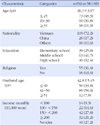Abstract
Purpose
The purpose of this descriptive survey study was designed to identify the stress coping types of married immigrant pregnant women and find out the differences in maternal-fetal attachment and maternal identity based on each types.
Methods
151 married immigrant women who visited 3 women's hospitals located in J-do for pre-pregnancy checkup were selected as study objects. Data were analyzed by dsecriptive statistics, cluster analysis, t- test, ANOVA, and Scheffé multiple comparison test.
Results
Cluster analysis revealed 4 distinct stress coping styles; low stress-coping involvement social support-oriented type, high stress-coping involvement hopeful thinking type, low stress-coping involvement type, effective stress coping types. Women frequently using effective stress coping type among the four types reported higher maternal-fetal attachment. The group of active coping styles got significantly higher score on maternal identity.
Figures and Tables
Table 1
General Characteristics of Subjects (N=151)

Table 2
Levels of Stress Coping Strategies, Maternal-Fetal Attachment, and Maternal Identity (N=151)

Table 3
Means and Standard Deviation of Four Stress Coping Strategies (N=151)

Table 4
Means Difference in Maternal-fetal Attachment and Maternal Identity according to Stress Coping Strategies (N=151)

Summary Statement
▪ What is already known about this topic?
Higher levels of stress of pregnant women were related to less optimal maternal-fetal quality of attachment, more negative attitudes towards motherhood and the self as mother.
▪ What this paper adds?
This review aims to consider evidence for the impact of stress coping styles on the fetal attachment to the mother, and the maternal identity of married immigrant pregnant women.
▪ Implications for practice, education and/or policy
There were a significantly the differences in maternal-fetal attachment and maternal identity based on stress coping types. The findings suggest the necessity of controlling the unfavorable stress coping types in preparing the stress-managing nursing intervention plan for married immigrant pregnant women.
References
1. Statistics Korea. Current status of international marriage [internet]. Seoul: Statistics Korea;2013. cited 2013 April 29. Available from: http://kosis.kr/statisticsvwcd=MT_ATITLE01&parmTabId=M_02_01_01#SubCont.
2. Lee IS, Park YS. Awareness of health and self-care in the pregnant women. Seoul J Nurs. 1996; 10(1):11–24.
3. Lederman RP, Ledermna E. Psychological adaptation in pregnancy: Assessment of seven dimension of maternal development. New York Jersey: Prentice Hall;1984.
4. Reeder S, Martin L. Maternity nursing. 16th ed. Philadelphia: Lippincott;1987.
5. Kim TI, Kwon YJ, Kim MJ. Phenomenological study on mothering experiences of the marred immigrant women in urban areas. Korean J Women Health Nurs. 2012; 18(2):85–97.
6. Lazarus RS, Folkman S. Stress, appraisal and coping. New York: Spring Publishing Company;1984.
7. Billing AG, Moos RH. Life stressors and social resources affect posttreatment outcomes among depressed patients. J Abnorm Psychol. 1985; 94(2):140–153.
9. Shin HS, Khu BY. Stress coping and its relationship to adjustment in Korean adolescents. Korean J Youth Couns. 2001; 9(1):189–225.
10. Park WH, Oh YJ. The Stress and stress coping styles in elementary school students. J Child Educ. 2008; 17(4):167–176.
11. Ahn SH, Park YS. Psychological adaptation in pregnancy and perception of birth experience. J Korean Acad Nurs. 1992; 22(2):157–173.

12. Mackey MC, Coster-Schulz MA. Women's views of the preterm labor experience. Clin Nurs Res. 1992; 1(4):366–384.

13. Hart R, McMahon CA. Mood state and psychological adjustment to pregnancy. Arch Womens Ment Health. 2006; 9(6):329–337.

14. Miller C. Making a difference: Yoga in pregnancy. Birth Gaz. 1996; 13(1):34–35.
15. Gutteling BM, de Weerth C, Willemsen-Swinkels SH, Huizink AC, Mulder EJ, Visser GH, et al. The effects of prenatal stress on temperament and problem behavior of 27-months-old toddlers. Eur Child Adolesc Psychiatry. 2005; 14(1):41–51.
16. Buist A, Morse CA, Durkin S. Men's adjustment to fatherhood: Implications for obstetric health care. J Obstet Gynecol Neonatal Nurs. 2003; 32(2):172–180.

17. Chung CS. Pregnancy, delivery and cultural integration of international marriage migrant women [dissertation]. Gyeongnam: Inje University;2011.
18. Cranley MS. Development of a tool for the measurement of maternal attachment during pregnancy. Nurs Res. 1981; 30(5):281–284.

19. Osgood CE, Suci GJ, Tannenbaum PH. The measurement of meaning. Urbana: University of Illinois Press;1957.
20. Walker LO. Investigating the semantic properties of two concepts. Unpublished manuscript. University of Texas;1977.
21. Hair JF, Black WC. Cluster analysis. In : Grimm LG, Yamold PR, editors. Reading and understanding more multivariate statistics. Washington DC: American Psychological Association;2000. p. 147–205.
22. Istvan J. Stress, anxiety, and birth outcomes: A critical review of the evidence. Psychol Bull. 1986; 100(3):331–348.

23. Jeung JH, Kim SH. The effects of group art therapy on the self-esteem and the stress coping styles of married immigrant women. Korean Art Ther Assoc. 2013; 20(6):1159–1177.
24. Moon EH, Kim JY, Jeung MK, Son HM, Oh JA. Anxiety-depression and maternal fetal attachment behaviors pregnant women with preterm labor and normal pregnant women. Korean Parent Child Health J. 2006; 9(2):128–139.
26. Park MK, Lee YS. The relationship among stressful life events, maternal-fetal attachment behaviors and childbirth variables during pregnancy. J Korean Soc Matern Child Health. 1999; 3(1):47–61.
27. Kang SK, Chung MR. The relationship between pregnant woman's stress, temperament and maternal-fetal attachment. Korean J Hum Ecol. 2012; 21(2):213–223.

28. Kim HJ. The study of the maternal identity and fetal attachment behavior by pregnant women. Sungshin Womens Univ Bull. 1997; 7:83–96.
29. Sung YS. Relationship between the body image and the maternal identity in pregnant women [master's thesis]. Daegu: Kyungpook National University;2005.




 PDF
PDF ePub
ePub Citation
Citation Print
Print


 XML Download
XML Download